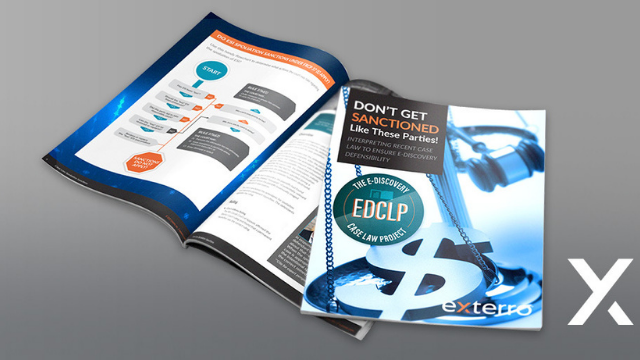A review of recent case law by EDRM Guardian Partner Exterro’s E-Discovery Case Law Project
Five or so years ago, legal professionals were hearing about “the end of sanctions.” Changes in the Federal Rules of Civil Procedure (FRCP), especially Rule 37 (e)’s requirement of a determination of “intent to deprive” to levy the most severe sanctions, reduced the likelihood of litigants accidentally stumbling into an e-discovery catastrophe. Increased adoption of technology, spurred on by state bar associations’ requirements for technological competence, undoubtedly played a role as well.
Exterro’s E-Discovery Case Law Project recently reviewed 10 case rulings from 2019 – 2021 in which a party moved for spoliation sanctions—five in which they were granted, and five in which they were not—to identify where the courts are drawing red lines and what you need to do to remain on the right side of them.
Tim Rollins, Exterro
But in recent years, talk of the demise of sanctions has lessened. A review of the last few years of e-discovery case rulings reveals that e-discovery sanctions are still an important tool for federal, district, and state court judges. While sanctions may not be as frequent as they were leading up to the 2015 FRCP Amendments, the risks of running afoul of them remain high. Judges have used e-discovery sanctions to underscore key principles of civil litigation, and they won’t hesitate to employ them when warranted
Exterro’s E-Discovery Case Law Project recently reviewed 10 case rulings from 2019 – 2021 in which a party moved for spoliation sanctions—five in which they were granted, and five in which they were not—to identify where the courts are drawing red lines and what you need to do to remain on the right side of them. Here are some key tips you should keep in mind based on what we found in our review of recent e-discovery sanction rulings in the white paper, Don’t Get Sanctioned Like These Parties!

So what got parties sanctioned in the analyzed cases?
- Destruction of evidence: In QueTel Corp v. Hisham Abbas, defendants destroyed a computer and deleted emails. A cease-and-desist letter should be more than enough to indicate “a reasonable expectation of litigation,” which under Rule 37 (e) triggers the duty to preserve.
- Destruction of an encryption key: In Doubleline Capital, LLP v. Odebrecht Finance, even the plaintiff’s premature motion for sanctions wasn’t enough to derail their request to present evidence of the intentional destruction to the jury.
- Failure in the “Duty to Preserve:” The defendants’ failure to follow through with preservation of relevant data in response to a legal hold notice was costly in Bolding v. Banner Bank.
- Sidestepping preservation with ephermal communications apps: One might think being incarcerated would deter defendants from using WhatsApp on a contraband phone, but you’d be wrong, as Federal Trade Commission v. Vyera Pharmaceuticals, LLC demonstrates.
- Perjury, Seriously?: Of course perjury is a bold red line in any legal matter. Spoliating ESI, then lying to cover it up, resulted in case dismissal in Williams v. American Cllege of Education.
The common thread, of course, is that spoliation sanctions arise from issues that take place early in the e-discovery process—largely during preservation and collection of electronically stored information (ESI). The key to avoiding sanctions, therefore, is to implement strong, verifiable, defensible legal hold processes, including:
- Notifying and reminding custodians of their duty to preserve
- Protecting potentially responsive data from accidental or intentional deletion
- Suspending data retention or deletion polices for data under legal holds
- Communicating effectively across multiple departments like Legal, HR, and IT
As the cases where parties narrowly avoided sanctions demonstrate, documented preservation polices will be viewed with good faith by the court, as they show that the party has no “intent to deprive.”
Learn all about recent trends in e-discovery sanctions in the Exterro whitepaper Don’t Get Sanctioned Like These Parties!


